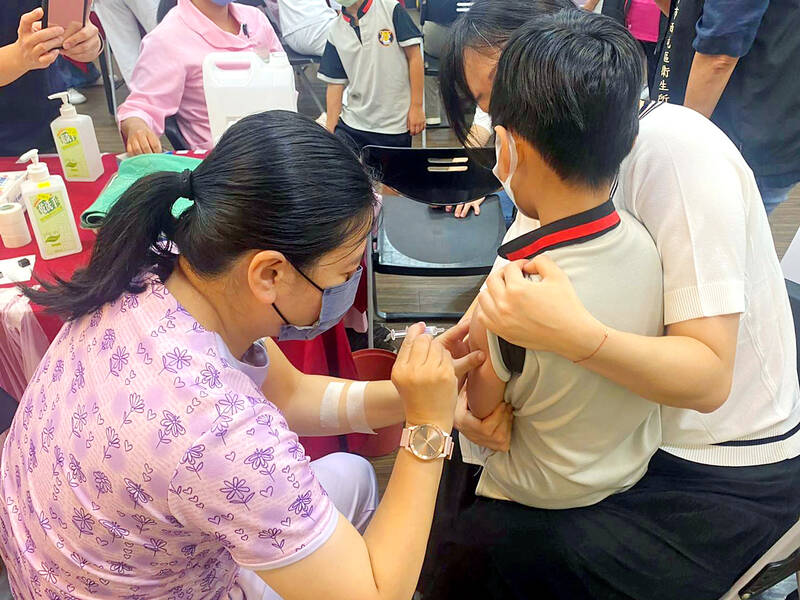Clinical trials in other nations could be used to prove vaccine efficacy and safety according to international standards, the Food and Drug Administration (FDA) said yesterday, in response to accusations that a Medigen application to import a South Korean influenza vaccine was approved without full clinical trials in Taiwan.
The government flu shot program that began on Oct. 2 for the first time included a fourth quadrivalent flu vaccine from South Korean drugmaker GC Biopharma imported by Medigen.
Chinese Nationalist Party (KMT) Legislator Wang Hung-wei (王鴻薇) on Monday said that she had requested that the Ministry of Health and Welfare provide records of Medigen’s application, including clinical trial results, but was rejected on the grounds that they are “trade secrets.”

Photo: Su Chin-feng, Taipei Times
“The only trials conducted in Taiwan were on people aged 20 to 50, with other trials all conducted in South Korea,” she wrote on Facebook, asking how the public can trust vaccine safety if the trial data remain opaque.
At a news conference in Taipei yesterday, FDA Deputy Director Cheng Hwei-fang (陳惠芳) detailed the vaccine approval process used to approve all six available brands.
There is no requirement that clinical trials are conducted in Taiwan, only within Asia, Cheng said.
Taiwan is also more stringent than South Korea, which allows children six months and older to receive the GC Biopharma flu vaccine, compared with three years and older in Taiwan, she said.
When studied through an internationally recognized method of assessing “ethnic factors in the acceptability of foreign clinical data,” the South Korean data were determined to be insensitive to ethnic factors and could therefore be considered in the review process, she added.
Medigen also submitted information obtained from GC Biopharma’s clinical trials conducted in three age groups — three to 18, 19 and older, and 65 and older — Cheng said.
The other approved flu vaccines were similarly determined to be insensitive to ethnic factors and did not require local clinical trials, she said.
As for the refusal to publicize Medigen’s application, Cheng said the FDA has an obligation to maintain the confidentiality of trade secrets under Article 40-1 of the Pharmaceutical Affairs Act (藥事法), and that the data constitute “trade secrets” as defined in the Trade Secrets Act (營業秘密法).

Taipei has once again made it to the top 100 in Oxford Economics’ Global Cities Index 2025 report, moving up five places from last year to 60. The annual index, which was published last month, evaluated 1,000 of the most populated metropolises based on five indices — economics, human capital, quality of life, environment and governance. New York maintained its top spot this year, placing first in the economics index thanks to the strength of its vibrant financial industry and economic stability. Taipei ranked 263rd in economics, 44th in human capital, 15th in quality of life, 284th for environment and 75th in governance,

The Sports Administration yesterday demanded an apology from the national table tennis association for barring 17-year-old Yeh Yi-tian (葉伊恬) from competing in the upcoming World Table Tennis (WTT) United States Smash tournament in Las Vegas this July. The sports agency said in a statement that the Chinese Taipei Table Tennis Association (CTTTA) must explain to the public why it withdrew Yeh from the WTT tournament in Las Vegas. The sports agency said it contacted the association to express its disapproval of the decision-making process after receiving a complaint from Yeh’s coach, Chuang

Control Yuan Secretary-General Lee Chun-yi (李俊俋) tendered his resignation last night, admitting that he had misused a government vehicle, as reported by media. His resignation was immediately accepted by the Control Yuan. In a statement explaining why he had resigned, Lee apologized for using a Control Yuan vehicle to transport his dog to a pet grooming salon on May 20. The issue first came to light late last month, when TVBS News reported that Lee had instructed his driver to take the dog to the salon. The news channel broadcast photos that it said were taken by an unnamed whistle-blower, which purportedly showed the

A former officer in China’s People’s Liberation Army (PLA) who witnessed the aftermath of the 1989 Tiananmen Square massacre has warned that Taiwan could face a similar fate if China attempts to unify the country by force. Li Xiaoming (李曉明), who was deployed to Beijing as a junior officer during the crackdown, said Taiwanese people should study the massacre carefully, because it offers a glimpse of what Beijing is willing to do to suppress dissent. “What happened in Tiananmen Square could happen in Taiwan too,” Li told CNA in a May 22 interview, ahead of the massacre’s 36th anniversary. “If Taiwanese students or